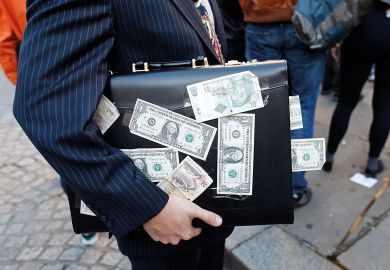Every lawyer involved in the trial of O. J. Simpson is going into print but few will say anything more interesting than Alan Dershowitz, whose contribution Reasonable Doubts has just been published.
Dershowitz is no newcomer to the "Trials I Have Won (or should have won)" genre. Indeed, his efforts on behalf of Claus von Bulow were published and later chronicled in the film, Reversal of Fortune.
Dershowitz is not a criminal lawyer in the Rumpole mould. He is a full professor at the Harvard law faculty appointed when only 28, the youngest in the school's history. He is a civil liberties lawyer and one of America's most distinguished defenders of individual rights. You may then be wondering what he was doing as part of Mr Simpson's "dream team" or indeed fighting the corner of the wealthy Austrian count. Well, the rich have civil liberties too, remember, and Dershowitz's real speciality is finding legal points for the Court of Appeal. He was there, therefore, "to provide a parachute" if things went wrong.
As it turned out, his brilliance was not required. However, you can never keep a good lawyer down and realising that the great general public think his former client was guilty anyway, he is conducting his appeal in writing for their benefit.
The verdict in the case of Orenthal James Simpson cost the American economy an estimated $480 million in lost output. Work ceased in factories, offices, operating theatres and even in the Oval Office at the White House. Trading volume plummeted 41 per cent on the New York stock exchange. Telephone calls dropped by 58 per cent. Judging by the decrease in water usage, people did not even go to the lavatory. It was maybe the most unproductive half-hour in United States business history. The only surge was in electricity consumption, as millions of people turned on their televisions. And the majority of those people who waited in anticipation for the jury's verdict believe that they got it wrong.
That public perception that O. J. Simpson did kill his former wife and her friend and that the legal system produced a miscarriage of justice is shared on this side of the Atlantic. The recent visit by the man himself, to debate at the Oxford Union and appear on prime time television, did little to change the view. He is presented as walking proof that our criminal justice systems, which are based upon the same principles, are weighted too heavily in favour of defendants and consequently guilty men cannot be brought to justice. Even thoughtful observers have difficulty with the idea that there may have been jurors who felt in their waters that Simpson "did it" but found him not guilty in law.
The jurors in the Simpson case were not, of course, asked to vote on whether they thought "he did it". They were asked whether the prosecution's evidence proved beyond a reasonable doubt that he did it. One of the jurors, a 63-year-old white woman named Anise Aschenbach indicated after the trial that she thought he probably was guilty but the evidence was just not good enough. If the prosecution does not discharge the burden of proof to the standard required by law in criminal cases, an acquittal is the proper verdict not just as a matter of law but of justice.
The standard of proof in criminal trials is higher than in civil cases because it is accepted that it should take more and better proof to convict a criminal defendant of a crime than to hold a civil defendant liable for monetary damages. Anise Aschenbach may well have been satisfied on the balance of probabilities that O. J. stabbed the victims to death, but we have traditionally held liberty in sufficient esteem to put the law's thumb on the defendant's side of the scales.
Proof beyond reasonable doubt in a criminal trial is premised on a fundamental value that it is far worse to convict an innocent man than to let a guilty man go free. But, there seems to be a cynical dismissal of those tenets as inappropriate in a world of rising crime. And not just in the US.
Former master of the rolls Lord Denning was happy to allow for the incarceration of men who might not be guilty when, in his now infamous "appalling vista" judgement in one of the Birmingham Six hearings, he indicated that that the preservation of the system took precedence over the possibility that the wrong men might be behind bars. The idea that a system which erodes the value placed upon liberty may be undermining its own foundations did not seem a consideration.
Many members of the public are given the impression by politicians and the media that large numbers of villains are walking free because juries unrepresentative of the respectable law-abiding classes, are duped, because legal rules tie the hands of policemen and because judges are second only to social workers in being bleeding-hearted liberals. This is about as estranged from the truth as Prince Charles is from his wife. The majority of contested trials end in conviction. Britain has the highest number of prisoners per head of population in Europe and our role model, the US, has proportionately six times more than us.
Yet the notion is that too many rascals get away with murder and the rules should be changed, irrespective of whether the price may be the incarceration of some who are innocent. The subtext is that it will really only affect those who are up to no good anyway.
The whittling away of the right to silence was based precisely upon this loss of belief in the precious nature of liberty. We seem to have lost the urgency which made citizens originally insist upon these rules of engagement. If we, as citizens, pass to the state the power to accuse and punish on our behalf, we must insist, for our own protection, upon the highest standard of proof not only because of the sanctions which the state can bring to bear but because, as against the might of the state, the individual is gravely disadvantaged. Even those as rich as the famous sportsman-turned-film star.
Dershowitz reminds us why the criminal trial cannot be a search for truth and shows that the jury's doubts were reasonable, given the questionable integrity of the police investigation. The case ultimately turned on the racial bias of the police rather than on the domestic abuse of the defendant. Although three quarters of the jury were women, they saw the evidence through the prism of race rather than gender.
The purpose of Dershowitz's book is not to persuade readers that they are wrong if they believe O. J. Simpson was guilty, it is to explain how under the US system of justice, the jury could have properly reached such a verdict so at odds with the conclusion reached by millions of people who watched the trial on television. In doing so, Dershowitz restates the values which underlie the adversarial trial and presents the strongest possible defence of the jury system.
What the author fails to recognise and nowhere addresses is the damaging effect of televising trials. I confess that I was initially supportive of the idea of letting the cameras in as a way of demystifying the courtroom processes and the law. However, I must admit to a change of heart. Having had access to the advocates and others involved in the recent Scottish experiment to televise trials, I have profound misgivings and they were reinforced by the circus which surrounded the Simpson trial.
Dershowitz, like most American lawyers, is utterly wedded to the American constitutional protection of freedom of speech, which prevents the existence of sub judice rules, as we have in this country. He accordingly fails to see adequately the impact upon the public of the daily expressions of opinion by lawyers and commentators. The public thought they saw and heard what the jury witnessed, when in fact few people stayed with the trial in its entirety and most were exposed to the spin of endless experts and chat show hosts.
Notwithstanding, Reasonable Doubts is a terrific book and, although the US legal culture is in so many ways different from ours, there are enough similarities for us to learn salutory lessons from this analysis. Unless the police are honest and the courts do a good job in keeping them honest, juries will continue to feel they have to do their work for them.
Helena Kennedy, QC, is chancellor, Oxford Brookes University.
Reasonable Doubts: The O.J. Simpson Case and the Criminal Justice System
Author - Alan M. Dershowitz
ISBN - 0 684 83021 3
Publisher - Simon & Schuster
Price - £12.99
Pages - 238
Register to continue
Why register?
- Registration is free and only takes a moment
- Once registered, you can read 3 articles a month
- Sign up for our newsletter
Subscribe
Or subscribe for unlimited access to:
- Unlimited access to news, views, insights & reviews
- Digital editions
- Digital access to THE’s university and college rankings analysis
Already registered or a current subscriber? Login



